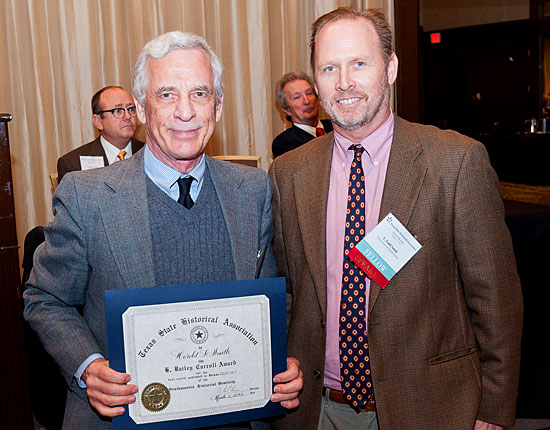UHV historian helps preserve women's history, wins TSHA award
 |
| Harold Smith, a University of Houston-Victoria professor, accepts the Texas State Historical Association’s H. Bailey Carroll Award from F. Todd Smith, chairman of the Carroll Award Committee and history professor at the University of North Texas. |
The story behind the first birth control clinic in Texas might have been lost to the ages if not for the keen eye of a University of Houston-Victoria historian.
Harold Smith, a UHV professor of history and humanities, discovered an intriguing collection of letters while researching Texas women during the 1930s for a 2010 book he coauthored with UHV lecturer Judith McArthur. The letters were between Margaret Sanger, the founder and national leader of the birth control movement, and Katie Ripley, a Dallas pioneer of the Texas movement.
The material was too extensive to include in the book, “Texas Through Women’s Eyes: The Twentieth-Century Experience,” so Smith used it as the basis for an article, “‘All Good Things Start With the Women’: The Origin of the Texas Birth Control Movement, 1933-1945.” This month, the Texas State Historical Association awarded Smith its prestigious $1,000 H. Bailey Carroll Award for the best article published in 2011 in the TSHA’s journal, the “Southwestern Historical Quarterly.”
Smith said he was honored to have received the award, especially since most of the previous winners have come from much larger research institutions.
“The previous winners include some of the most important historians of Texas during the past three decades,” he said.
Smith worked on the article over a period of four years, during which time he made research trips to the library at Texas Woman’s University to study in depth the letters in Ripley’s collection, and to Smith College in Massachusetts, which holds the letters in Sanger’s collection and the records of the national organization Planned Parenthood of America.
“No one seemed to be aware of this correspondence, but I recognized this was a real treasure,” Smith said. “I realized it was the basis for an exciting story about the origin of the Texas birth control movement in the 1930s and the role of Margaret Sanger in that segment of Texas history.”
In his research, Smith discovered that Ripley had initiated contact with Sanger for advice about how to establish a successful birth control clinic, as Sanger had set up the nation’s first birth control clinic during World War I in New York City to serve married women who couldn’t afford to go to a private physician.
“Ripley viewed Margaret Sanger as a celebrity, and you could tell from her letters that she was very excited to be corresponding with a woman of such national importance,” Smith said.
With Sanger’s guidance, Ripley succeeded in establishing the first birth control clinic in Texas in 1935 in Dallas, and they became friends who continued to correspond through the 1950s. Sanger would even stay with Ripley when visiting Texas to give lectures in major Texas cities, he said.
Perhaps most fascinating was learning that these women who founded the Texas clinics succeeded in their efforts as volunteers working at a grassroots level with no instruction or prior training, Smith said.
“Before I started reading the letters, I was not aware of all the practical problems in setting up a birth control clinic,” he said. “Through my research, I was able to trace some of the problems Ripley had to deal with in establishing a clinic in the 1930s and how, through Sanger’s help, she was able to overcome those difficulties.”
His article has made a wave in the women’s history world, both nationally and internationally. Editors of the national Margaret Sanger Papers Project launched their March 2011 Women’s History Month blog with a discussion of Smith’s article. At the University of Leeds in the United Kingdom, the article is being used as required reading for the course “Race, Gender and Cultural Protest in the U.S. Since 1865.”
Smith’s work as a noted historian speaks to the caliber of the university’s faculty members, said Jeffrey Di Leo, dean of the UHV School of Arts and Sciences.
“Preserving an important piece of Texas women’s history and winning the H. Bailey Carroll Award for the best article published in the Southwestern Historical Quarterly are impressive achievements,” he said.
The TSHA award is not Smith’s first. For “Texas Through Women’s Eyes,” Smith and McArthur last year were presented the TSHA’s $1,000 Carpenter Award for the best book about Texas women’s history published in 2010 – their second book to win the prestigious award.
A member of the UHV faculty since 1976, Smith began researching and writing about British women’s history in the mid-1970s. While his interest in British women’s history continues, during the past decade, he has focused on Texas women’s history.
The University of Houston-Victoria, located in the heart of the Coastal Bend region since 1973 in Victoria, Texas, offers courses leading to more than 80 academic programs in the schools of Arts & Sciences; Business Administration; and Education, Health Professions & Human Development. UHV provides face-to-face classes at its Victoria campus, as well as an instructional site in Katy, Texas, and online classes that students can take from anywhere. UHV supports the American Association of State Colleges and Universities Opportunities for All initiative to increase awareness about state colleges and universities and the important role they have in providing a high-quality and accessible education to an increasingly diverse student population, as well as contributing to regional and state economic development.
Paula Cobler
361-570-4350




